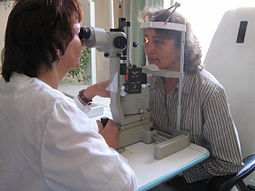Ophthalmologic

Eye examination with aid of a slit lamp.
|
|
| System | Eye |
|---|---|
| Significant diseases | Blindness, cataracts, macular degeneration, glaucoma |
| Significant tests | Visual field test, ophthalmoscopy |
| Specialist | Ophthalmologist |
Ophthalmology (/ˌɒfθælˈmɒlədʒi/ or /ˌɒpθælˈmɒlədʒi/) is the branch of medicine that deals with the anatomy, physiology and diseases of the eyeball and orbit. An ophthalmologist is a specialist in medical and surgical eye disease. Their credentials include an M.D. or D.O. degree in medicine, followed by an additional four years of residency. Additional training may be sought through a fellowship in a particular specialty of eye pathology. Ophthalmologists are allowed to medically treat eye disease, implement laser therapy, and perform incisional surgery when warranted.
The Greek roots of the word ophthalmology are ὀφθαλμός (ophthalmos, "eye") and -λoγία (-logia, "study, discourse"), i.e., "the study of eyes". The discipline applies to all animal eyes, whether human or not, since the practice and procedures are quite similar with respect to disease processes, while differences in anatomy or disease prevalence, whether subtle or substantial, may differentiate the two.
The Indian surgeon Sushruta wrote Sushruta Samhita in Sanskrit in about 800 BC which describes 76 ocular diseases (of these 51 surgical) as well as several ophthalmological surgical instruments and techniques. His description of cataract surgery was more akin to extracapsular lens extraction than to couching. He has been described as the first cataract surgeon.
...
Wikipedia
